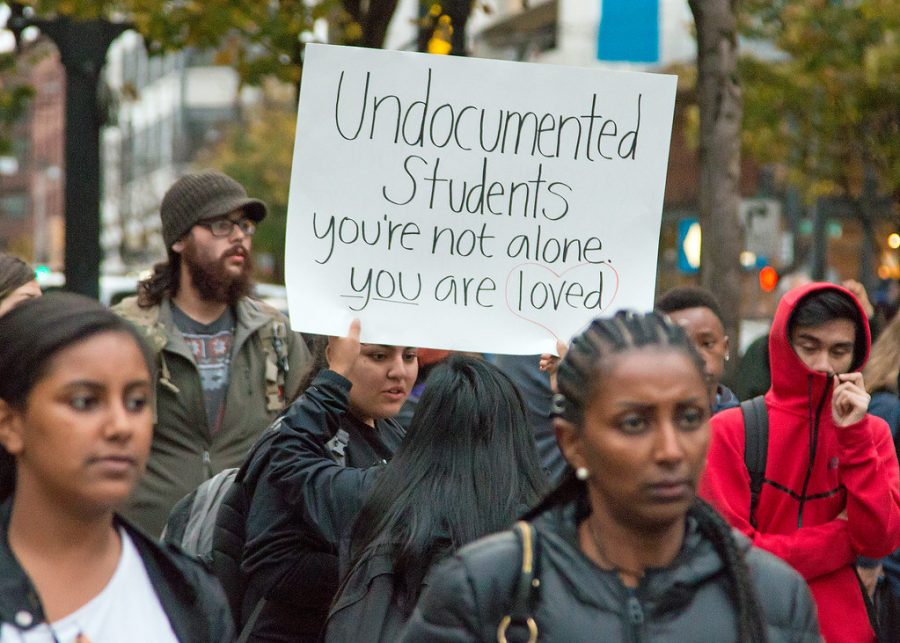Poma: Undocumented Students Are Just as Worthy of the Resources Given to Citizens
February 9, 2020
Undocumented students in the U.S. are unable to apply for federal aid and thus face the difficult challenge of finding alternative means to pay for higher education. While the University of Utah and other colleges have resources to help these students, their reception of financial aid as a noncitizen is oftentimes misconstrued as a “free pass” to college. In reality, these students work just as hard as documented students and should be offered comparable resources because of their work ethic and potential. They make the most of the opportunities they’ve been given, and documentation should not stand in the way of their future success.
The U has several resources on campus to help DACA recipients, “Dreamers” and other undocumented students fund their learning endeavors. Most notably, the Dream Center provides personalized aid for students who want to attend college in Utah, and this organization helps students until their graduation. The Dream Center offers many scholarships and general guidance through admissions process. As a whole, the state of Utah presents numerous scholarships tailored to the needs of different students’ circumstances.
While these resources are certainly a step in the right direction, the U needs to find more ways to welcome and help students from the very moment they submit their application — not just during the first few weeks of school. Student Andrea Jiménez earned a full-ride scholarship to the U, but it was promptly removed once her legal status was discovered. Many students find themselves in this same boat despite working tirelessly towards their goals. If the U application must require an applicant’s status, it should present the proper resources and clarify a different path for undocumented students. These processes should be done as openly as possible, perhaps starting as early as information sessions at high schools. Speakers could immediately establish that the U is a safe space by pointing undocumented high schoolers to the Dream Center. This up-front honesty could ensure that no one’s time is wasted and that undocumented students obtain the appropriate aid they need — without stigmatizing their needs.
Unfortunately, openness is often complicated by common misconceptions about undocumented students and the funding they receive. The average person may think that undocumented students are simply granted any scholarship out of “pity.” This misunderstanding leads them to believe that undocumented students immediately pay in-state tuition rates or even go to school for free.
This idea couldn’t be further from the truth. For one thing, federal aid — like FAFSA — cannot be obtained without proper documentation, even for students under DACA. Any scholarships earned legally through Utah state aid or through the U cannot be issued to undocumented students even though they may have the credentials. The only thing actively working in favor of undocumented students is the in-state tuition rate under Utah House Bill 144, where there must be specific circumstances for the student to qualify.
Undocumented students earn their grades and academic standings by working just as hard as any other high schooler, often overcoming their unique circumstances. Jiménez and other peers stood at 4.0 averages — truly utilizing the education opportunities offered by this country.
The misunderstandings regarding tuition for undocumented students often overlook the reasons why the university and other institutions try to help these students. The Dream Center does not hand out scholarships like candy, but rather it orients the undocumented student towards legalization and helps them find funding while their status is being rectified. Scholarships also go towards helping those who cannot afford the ever-growing price of tuition. Undocumented immigrants are not immune to poverty, which makes them eligible to receive those scholarships.
All these students want is a fulfilling and engaging education — just like any other student who attends the U. If anything, undocumented students often actively deserve their academic standing because they’ve overcome circumstances drastically different from that of the average person. For many, their parents brought them here as children in search of a brighter future. While these children couldn’t choose to come to the U.S., they value hard work and recognize the opportunities they’ve been granted. Someone who works towards their goals shouldn’t have doors closed to them – these students embody the American Dream.
At the end of the day, undocumented students need proper resources and support for their situations. Any aid they attain must be earned — just as any other student — and these resources only provide opportunities to those who seek the help they need. Undocumented students deserve the opportunity to strive for excellence, regardless of where they come from and why. We must look out for our undocumented friends within the student body. Ensuring that everyone can get the aid they need helps not only marginalized students but everyone at the U.








